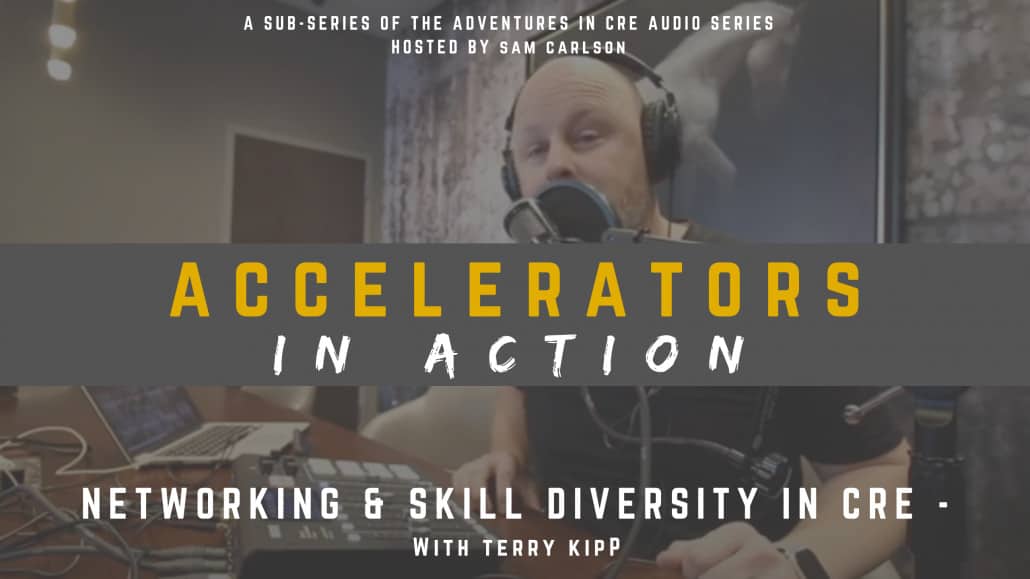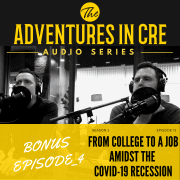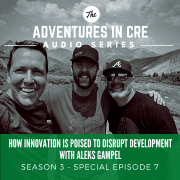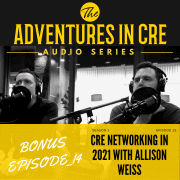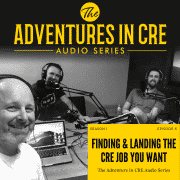Networking and Skill Diversity in CRE with Terry Kipp – AiA
A lot of incredible real estate professionals have gone through the A.CRE Accelerator and we think sharing their stories will add value to your career. In this episode of the A.CRE Accelerators in Action series, Sam talks with Terry Kipp, a Senior Investments Associate at a family-owned real estate investment company.
Terry’s career story is one of deliberate networking and the opportunity to have worked on a diverse range of commercial real estate deals. With experience across the property type spectrum, and at both large institutions in NYC and mid-sized family offices in the South, Terry’s perspective is valuable to CRE professionals at all stages in their career.
This is our first in a growing series of interviews with commercial real estate professionals. This Accelerators in Action series tells the stories of CRE professionals at all stages of their career, from students to senior-level professional. Their experiences will provide you with insights into how to take your real estate career to the next level.
Listen to this Episode – Networking and Skill Diversity in CRE with Terry Kipp
Resources from this Episode
- Adventures in CRE: https://www.adventuresincre.com/
- View our CRE Career Resources: https://www.adventuresincre.com/careers/
- A.CRE Accelerator: https://www.adventuresincre.com/accelerator/
Episode Transcript – Networking and Skill Diversity in CRE with Terry Kipp
Sam Carlson (00:00):
Hello and welcome back to Accelerators in Action. Today we have an absolutely amazing guests, Terry Kipp. Let’s get started. Making your Mark in commercial real estate is a journey. Best travel with grit, determination, and a mindset to take action. To most success at the highest levels is a fleeting thought, an unrealistic expectation, but to others opportunity boils down to focus, preparation, and a lifelong commitment to learning and improvement. Join me as I take you into the lives of those unwilling to leave their success to chance and instead take complete control of their futures. These are action taking, limit breaking, never faking accelerators in action.
Sam Carlson (00:49):
All right, well, I am extremely excited. I love doing Accelerator in Action podcasts, especially to meet people like you, Terry. So thank you so much for coming on. How are you doing?
Terry Kipp (01:03):
Doing great. Well thank thanks for having me, Sam. It’s a pleasure to be here today.
Sam Carlson (01:06):
Yeah, we’re going to have a lot of fun. So it’s people like Terry, it’s your stories that we really want to highlight in this podcast and today, again, I’m excited and you and I talked a little bit beforehand and so I really think that your insights and your experience are going to be a lot of fun and also very telling for people who want to maybe take their career in a direction to where they… it seems to me like you have a lot of control, a lot of fun, a lot of flexibility and so I think we’re going to have a great, great podcast today. So again, thanks for coming. By way of getting started, it’s always kind of a good place to have the backstory to know a little bit about you. So let’s start there. Maybe start with a little bit about you personally, professionally and kind of get us kicked off that way.
Terry Kipp (01:58):
Yeah, sure. So I grew up in Huntington, West Virginia, which is a small town. Really the easier way to describe geographically where it is is really describing it is it’s a few hours away from Cincinnati in Columbus, Ohio. And so growing up in West Virginia, there was little understanding of the finance world or even real estate finance. I didn’t even know that these paths really existed until going to college. And so I grew up in West Virginia and then I transferred from Marshall University, which is the local school in West Virginia to Seton Hall University, which is right outside of New York city in South Orange, New Jersey. And I decided to study finance. For me, it was an area that I had an interest in but really wasn’t sure what part of finance that was going to be of the most interest.
Terry Kipp (02:55):
And so I really was geared up to go into investment banking or sales and trading route I was trying to determine the two of those and I had a few classmates that were starting to get into real estate. And that’s when I really started to understand that there could be a path to go into real estate. And one of my mentors, he’s actually a year ahead of me at Seton Hall, they were great at giving me some advice and some exposure to the business. And it wasn’t until my sophomore year when I had a chance to, I was actually interviewing for an investment banking position in New York city and the job fell through and I did not have a backup for that summer and luckily one of my mentors found an opportunity and was able to help me get an introduction to the firm and it was a startup company in real estate. And after going through that, Rob was doing acquisitions and demolition work for single family and smaller multifamily projects. I knew at that point that real estate was the path that I wanted to go down.
Sam Carlson (04:06):
Wow. That’s really cool. So let’s maybe backtrack just a little bit. So you started out in finance and was the thought there? What was the initial career path before you knew anything about commercial real estate?
Terry Kipp (04:19):
For me, when I made the transition from West Virginia to the New York area I had only watched movies and kind of heard about the world of finance, you thought stocks and bonds and that’s kind of the general thought. And so I really had thought that I was going to go and become a trader on wall street initially.
Sam Carlson (04:43):
Oh, that’s interesting. So you got into finance thinking, you watch like Gordon Gecko and guys like that and you’re thinking, hey, this seems like a pretty exciting gig. Is that kind of where it started?
Terry Kipp (04:55):
It really did. I had started learning a little bit about the stock market before going up there in the New York area and then I started to learn more about it and the nuances of taking finance courses and I even had a project finance class that I didn’t know at the time would be extremely helpful when I decided to transition over into real estate. But Seton Hall, they’re really more geared for investment banking or sales and trading, they have a mathematical finance program, but they really don’t have a lot of real estate courses. And so for me when I did decide to make that pivot, it was critically important for me to find external resources to really try to learn and dive into the business.
Sam Carlson (05:45):
Yeah. So what drew you to CRE? How did you learn about… were you talking with a friend? Did you have a particular class or what was kind of the little spark that ignited all of this?
Terry Kipp (05:56):
So I was a part of an investment club at Seton Hall and through that I ended up meeting a dear friend of mine who I’m still really good friends with today and he’s been a mentor to me really throughout my whole career. I mean, he had a lot of real estate experience and background and had been doing real estate really since high school and he had always been interested in it. And so building out that friendship really started to show me the opportunity in the space. And through that, that’s when the investment banking opportunity fell through, I decided to start looking for more entrepreneurial opportunities and it ended up being at a startup real estate company.
Sam Carlson (06:38):
Yeah. So [inaudible 00:06:40] real estate company, let’s do something, let’s jump forward to where we’re at today and then kind of come back to what brought us to that moment. So describe a day in your life, what do you do today? How does that all work? And talk a little bit about your job because I really, when we were talking about it, I’m like man, I know that sometimes people can get caught into a rut in their different positions, but you seem like you’ve got a really fun and fulfilling position. So talk to us about today what a day looks like for you.
Terry Kipp (07:12):
Absolutely. So I’m currently working with a family owned investment company that has their own capital in house. And we really play across the spectrum in real estate investing, anything from buying a core like asset to developing an asset. And we can do our own projects, we can partner with other institutional lead sponsorship and so we work on acquisitions, development and we also play across the capital stack where we may invest in preferred equity or mezzanine investing as well.
Sam Carlson (07:48):
So again, a lot of people get stuck into whether they’re boxed in because of I mean there’s always pros and cons, but you have a lot of flexibility and you get to look at a lot of different deals, do you feel like that’s probably, I mean, is that what makes what you do really exciting or is that a challenge for you? How do you see that?
Terry Kipp (08:11):
I think it makes it exciting. I mean, you see different opportunities in the industry right now where we are in the economy and looking at things from a fundamental standpoint being able to play across the capital stack really allows you to continue to invest through the cycle. I think having that flexibility it’s critical given where we are today. And so I find it very exciting and you have to constantly be looking at things from different angles, which I think overall it makes you a better investor.
Sam Carlson (08:44):
Yeah. It’s like flexing muscles, if you’re doing a lot of dynamic different exercises, you get a very overall strong unit. So if we go back to your first gig in real estate, is this the first company you worked with? Have you been within the whole time or have you kind of transitioned through your career?
Terry Kipp (09:05):
So I’ve transitioned throughout my career. The startup company was really my first real introduction into the real estate business. And this was back in 2013 when I was a sophomore in college and I was a working elbow to elbow with the founder of the company because it was a small firm. But they really pulled me under their wing and taught me a lot about underwriting and due diligence and market research and actually gave me a lot of rope and had me out buying deals and structuring deals and even carrying out the construction side. I mean we were focused on single family and multifamily units up to 20 units in the New Jersey market and it was a great learning experience. I think for me though, I knew that that industry was much bigger, there was much more opportunity across the board and so I started looking at opportunities to expand my skillset to be more appealing to some of the larger institutions. And in doing that coming out of school after graduating, I’d made it my goal to transition into one of the larger institutional firms and I was able to do that by landing my first post-graduation job with Prudential Real Estate Investors.
Sam Carlson (10:26):
Okay. So you went from the startup and it sounds like in that startup gig you really got in the dirt, like hands on really into the nitty gritty of the real estate world. Is that accurate?
Terry Kipp (10:40):
Absolutely. I mean I was out with brokers looking at properties, actually putting in offers on properties, doing due diligence and working with the construction team to actually carry out the renovation. And so it was a great experience and really solidified my interest in going into real estate.
Sam Carlson (11:00):
Have you ever felt like there’s been, because it seems like you’re extremely well-rounded, anything you do, you kind of go in and you get a lot of exposure to a lot of things. Have you ever felt like, hey, maybe I should focus or have a niche specialty in any particular area?
Terry Kipp (11:18):
So what I’ve really decided to do is specialize my skillset which I decided to focus really on the underwriting side. Going into the business in a more junior setting I wanted to have the flexibility to work across different property types before deciding on really specializing longterm. And so fortunately enough for me most of the roles I’ve had, I’ve been able to stay more generalist at this point, but really focused on mastering the underwriting and developing myself into hopefully being the go to person at the firm for anything financial or underwriting related.
Sam Carlson (12:01):
Yeah. So one of the things that I like to ask folks on accelerators in action is skills. If you are competing against anybody, whether you’re a company or an individual for a position or whatever the case is, your ability to compete is really strengthened by the skill set you have. So you’ve chosen the underwriting, correct?
Terry Kipp (12:24):
That’s right.
Sam Carlson (12:25):
So talk to me about developing that skill. I mean, what has that been like? Did you start out saying, “Hey, I’m an analytical person so I want to play more to my strengths,” or what was that process like?
Terry Kipp (12:42):
Yeah, I think for me I was naturally good at math and really after taking the project finance class realized that that’s really telling the story of the business plan with numbers and making sure that I understood the nuances of different property types and really the assumptions that go into it and the market research that goes into it. It helped me understand the business as a whole a lot better and so I decided to really specialize into that one thing to get to mastery level and use that as a leverage tool to get into these jobs, which it ended up actually working by doing that. And I do think you have to be well versed across underwriting, I mean for me at the time, not knowing if I wanted to specialize in multifamily or office or retail, being able to do any type of financial model and excel and then also understanding how to use ARGUS was a big leverage tool that I used to help get into the industry.
Sam Carlson (13:51):
Yeah. So do you feel like, I mean understanding and really it comes down to we always want to focus on the shiny new bright object and that’s what everybody talks about, but whenever you look at somebody that’s a seasoned professional, they’re usually just a master at the fundamentals. And so your approach, do you feel like, I mean all of the positions and jobs that you’ve had, has it come down to that one thing, do you think?
Terry Kipp (14:21):
Well, I think you have to develop your skills around that. And I think, but for me breaking in, I mean you’re competing against very smart hard working people, some people have a great network that gives them a slight advantage. And so to me by being really good at one thing, finding that one thing to be really good at it gets you in the door and then you really have to mold your skill sets around that to become a more well rounded professional. But for me, I think the analytical side having done waterfall structures and partnership breakdowns and actually going through that in detail with the people that were interviewing me, it was a huge advantage.
Terry Kipp (15:08):
Even though I was more junior, I mean a lot of the people in real estate that I was competing against had two to four years of work experience and I was coming right out of college with internships. And so you really had to try to show that you were well-rounded on the underwriting side and that you understood some of these concepts in order for you to really win out on those positions because the people you’re competing against, the odds are some of them have actually worked on deals and it wasn’t just they’ve been through some training, I mean, they’ve actually done deals. So you have to really show that you can do the work and come out of the gate strong.
Sam Carlson (15:52):
Yeah. You mentioned previously network and mentorship and I think… so I mean we really discount the value of those things. Not everyone, but we really seem to underplay how crucial the mentorship role or the right relationships role can really play in your career development as well as just going to the next level in your career. So what role has that fulfilled in your career advancement and how do you use it to develop your career today?
Terry Kipp (16:34):
So it’s a great question and for me, I think both the network and mentoring side has been critical for me to be able to have the positions that I’ve had. As I mentioned, the one mentor who’s also a great friend of mine from college, I mean he was actively working for Prudential Real Estate Investors while he was in college and really through that relationship that I had and learning under him, it really opened the door for my first job postgraduate because he had already built those connections and really did a great job for the company so he had a great reputation. And so I do think that and just continuously networking with other professionals. I mean, I had a routine where I would reach out to five industry professionals.
Terry Kipp (17:25):
It always seems better when you’re a student to reach out, people aren’t as opposed to that with cold emails when you’re a student. And I would reach out to five industry professionals every day, Monday through Friday, and try to set up just brief calls to really get out there, get what they’re thinking, how they’re looking at the market and really trying to process all that. Because when you do go through interviews, if you’ve done those type of calls, not only are you expanding your network, but you’re sharpening your skillset and you’re sharpening your understanding of the business by talking to people with different point of views and really different specialties in the business.
Sam Carlson (18:07):
That’s a fantastic, I mean, as far as again, we call this Accelerators in Action and this is all about how are you taking action? And so the mentorship is amazing, but also some people might think, well I don’t have the natural network for whatever reason or I don’t have a mentor. But you had a very proactive approach to start reaching out and getting those relationships, getting those conversations. And I’m guessing because of your authenticity, you had some success there.
Terry Kipp (18:44):
Yeah, I was very fortunate to have some of the conversations that I’ve had and one of the things that I would always add to every conversation was after having a chance to speak with me and understanding my objectives, is there anybody else that you think would be great for me to speak with? And then you really have all these different people who, some of them will start to open up their own network and start doing it that way. And I’ve learned that by having those phone calls and it’s exponential on how fast you can grow your network and that I really believe that my success in getting the positions that I’ve had you got to have the skillset, but you have to work across multiple areas to really put yourself in the best position. And I think that that networking work ethic is what will help me get there.
Sam Carlson (19:36):
Yeah. Well I always butcher even paraphrasing sayings and things like that, but it’s always like, yeah, you’re an overnight success after years and decades of work, right? And it’s that same thing, when you’re laying the groundwork for these networks and for these relationships, it’s not the one relationship, sometimes it is. It’s not the one relationship that’s going to catapult you to Gordon Gecko level, right? But it’s the cumulative effect of all of them, correct?
Terry Kipp (20:15):
Absolutely. Absolutely. And I think it also is reassuring to the people that you are speaking with when if they’re talking to a colleague or you’re at an event and you come across multiple people and they realize, oh wow you knot this person as well. It’s kind of showing that you’re working hard and you’re getting yourself out there and you’re meeting people. And I think that skillset is going to carry out well throughout your career because I mean that’s a critical part of deal making and helping your own firm grow from a business development standpoint. So all of those things are building another type of skill that I think is extremely valuable throughout your career.
Sam Carlson (20:57):
Do you have any one particular story that you could share that kind of maybe led to a pretty big opportunity or maybe it was just a cumulative effect thing? Do you have a story or was it just all of the things put together?
Terry Kipp (21:12):
Sure. Yeah. So I have a story that it was really interesting, I was young and I was probably a junior in college and I had reached out with a cold email to a high up professional at one the large industry conferences. And I didn’t expect him to call me back, but an hour and a half later he gave me a call back and the next week I had an interview for [JLL 00:21:44] and he had a great relationship with them and it was just… he was so I guess thankful that somebody had the courage to reach out to him directly and I guess he just didn’t get a lot of those calls but loved the hustle and so he actually took it upon himself to make a few introductions to JLL which was one of my first big interviews while I was in college.
Sam Carlson (22:11):
Isn’t it interesting that it seems like when you look at all of the people out there that are trying to achieve things, there is a fraction of, I mean, I don’t know, obviously we don’t have any stats to back this up, but there’s a small minority that will actually do the things that other people are really scared to do. Because if you think about it, you send out an email to that one contact and it leads to some amazing contacts at JLL, potential opportunities and so on and so forth. You just don’t know where it leads. Or you sit there and you say, “Well, no new opportunities came over my desk today or into my email today. I guess things are a lot harder than I thought they were going to be.? You know what I mean?
Terry Kipp (22:55):
Right. And I think the other lesson that I learned through that networking and doing that process was even when you do get the job, the industry is a pretty small industry and you never know, you may have colleagues who go on to other opportunities and at some point in the future there could be an opportunity at that firm that you’re interested in and so I think the networking externally when you’re trying to get in a job is critically important, but kind of within the company as well, just really building out those relationships with your colleagues and sharing what your real goals are, your career. I think helps you in the long run and you’ll have that network to tap when it’s [inaudible 00:23:43] important later down the road.
Sam Carlson (23:45):
So, I started doing this thing about, I don’t know, five years ago and it’s something I call windshield time. And it’s basically, I mean it’s me sitting behind the wheel of my car driving and either listening to a book on tape, a podcast, something educational, something to at the beginning of the day help me learn something. And it’s because whenever I’m doing… if I’m doing something consulting business or putting a deal together or whatever the case may be, I want to have the skills and the mentality to be the best. I’m far from perfect, definitely don’t have the best skills or experience out there, but I have found if I can do something small on a daily basis, it compounds over time. So I’m wondering, do you have any things like keys to your success, daily routines, anything that you’ve found has really been beneficial to you as you obviously you’re become a seasoned modeling pro here, so any daily routines or anything like that that’s been kind of instrumental to your success?
Terry Kipp (24:58):
Yeah. I think especially earlier on in my development when I was learning how to model, I mean my goal was to learn five things a day. I tried to kind of batch things into groupings like that, but just kind of forcing myself to progress by learning a new function or a new way to model something or learning something new about partnership structures or just continuing to develop yourself in the business and I think you need that continual progress to really look back over a year and be able to see the changes that you’ve been able to make and your understanding of the business. And so that’s one of my biggest things is I think for me is continued education is critically important, finding people who are thinking differently or more granular, just trying to understand how they approach their thought process.
Sam Carlson (25:56):
And you said it perfectly, you look back over a year and you’re like, oh wow, I did a lot, I achieved a lot by doing this one small thing. I mean learning and approaching five new things a day or whatever the case may be, whatever your objective is, it may seem especially at first it’s like going to the gym at first, that’s a lot of fun. The first initial two, three weeks, they’re awkward and they’re not real fun maybe, but after that, when you look back at the body of work that you can assemble over a year’s worth of time, it’s absolutely amazing what you can achieve. So I couldn’t agree with that more. So in conclusion, kind of imparting words, any last pieces of advice, anything you would want to share with folks listening to this? What would you like to conclude with?
Terry Kipp (26:47):
Yeah, I think for me some of the best advice that was ever given to me was if you want to obtain something, if you want a career in real estate, you have to change your circle to do that. And so for me it was going to industry conferences, if you can’t afford to go because some of them are expensive, offer to volunteer. Just anything you can to surround yourself with the professionals in the business, you’re going to learn at time just by hearing other people talk shop, but for me, I think the people component to real estate is here to stay and I think doing that is a great investment of your time and it’ll be a great investment for the relationships that you’re going to build.
Sam Carlson (27:33):
Yeah, I could not agree with that more. They say you’re the average of the five people you spend the most time with. And so that’s the easiest way. The easiest way to change what you’re doing is to change your environment and that begins with the people you surround yourself with. So that is absolutely great advice. Hey Terry, thanks so much for being on this episode of the podcast.
Terry Kipp (27:54):
Absolutely. Thanks Sam. I look forward to hearing the rest of the series as well.
Sam Carlson (27:58):
Yeah, it’s going to be a lot of fun. And everybody listening, thanks for tuning in. We will see you on the next episode of Accelerators in Action. Thank you for tuning in to this episode of Accelerators in Action. For show notes and additional resources, head over to www.adventuresincre.com/audioseries. Would you like to learn real estate financial modeling in a matter of weeks and do it with zero guesswork? If so, the ACRE accelerator is for you. The accelerator is a step-by-step case based program designed to teach you exactly what you need to know and in the order you need to know it so you can gain both the knowledge and experience to take your career to the next level. To see if the accelerator is right for you, go to www.adventuresincre.com/accelerator.

